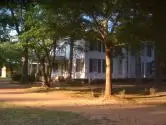A Walk With William Faulkner

Oxford, Mississippi.
I entered the grounds to Rowan Oak just as the sun was setting. The gates were locked, but I had no trouble climbing over the low wooden fence. What could they say to a former English teacher, who, as a seventeen-year-old in Illinois had read “As I Lay Dying” and “The Sound and The Fury” without understanding half of what Faulkner had been saying. I roamed the manicured grounds freely, watching the freshly cut lawn run gently down to the edge of the woods that nearly surrounded the old plantation homestead.
Tall, tired cedars shaded the house and the hand-hewn logs of an ancient out-building. An empty stable made me pause. Did William Faulkner ride horses?
It was a place every writer would dream of living. To spend your mornings in his second-floor study, outlining your next book on the white-washed walls, gazing out over the lush lawn, listening to the children, the dogs and the horses, impatient, as always. Then, after lunch, as he was prone to do, taking up a project: mending fences, replacing windows, adding a downstairs study. Old houses need as much attention as dogs and horses. Or novels.
I could not help but be reminded of Ernest Hemingway’s second floor studio above his garage in Key West, where he, too, could gaze out a window at a small patch of grassy yard, patrolled by his famous herd of six-toed felines.
Faulkner, Hemingway, Fitzgerald. The idols of my youth. Men who I later learned were racked with their own demons, their own frailties, with a weakness for drink, brought on, no doubt, by the frustration of attempting to capture on a thin sheet of paper all the mystery and misery of life. The same frustration an artist must feel, with her hand at the canvas, knowing the brush can never capture what the eye has just witnessed.
I learned that Faulkner had bought this dilapidated mansion back in 1929 for just six thousand dollars. The neighbors must have laughed at the idea of this young novelist attempting to fix up the old plantation house that no one else in town would touch. He spent his mornings at his Monarch typewriter and his afternoons at his table saw. Historians will continue to debate which one drove him to seek solace each evening from his old friend, Jack Daniels.
Fitzgerald never had the stability of a home like Faulkner’s, firmly rooted in Southern soil, each window symmetrically placed and flanked by sturdy shutters. Or like Hemingway’s escape in Key West and his sympathetic cats. Fitzgerald was the itinerant writer, always moving, always feeling like he had never found his place. The writer who had peaked when he was just 23 and who suffered the rest of his short life, just 42 years in all, searching for his lost moment of genius. Trying to recapture that youthful enthusiasm that slipped away with the final chapter of “The Beautiful and The Dammed.”
Faulkner found it. He found the stability and the seclusion that he needed to write. And that is part of the reason why, 100 years from now, William Faulkner will be more greatly appreciated than he is even today, while Fitzgerald will have been accorded his fifteen minutes of fame and propped up next to the Flapper Girls, bathtub gin and the Roaring Twenties.
Spokesman for the Guilted Age.
I have slept in the room at the Grove Park Inn where F. Scott Fitzgerald lived for nearly two years. I have stood in the room where Hemingway wrote “A Farewell to Arms” and now I have walked the garden paths where Faulkner walked, working out the characters and the complexities of his next novel. I never felt F. Scott Fitzgerald’s spirit at the Grove Park Inn like I felt Hemingway’s in Key West and Faulkner’s at Rowan Oak.
And as he stood at dusk, at the end of a long day, looking back at his stately home, Faulkner must have felt some sense of satisfaction, knowing that he had preserved a piece of Southern history, just as he had done in “The Sound and The Fury.”
A Southern house, fit for a Southern writer.

Until next Monday,
Have a great week!
– Bruce
Postscript:
It is nearly dark and I am walking down a side street in Oxford, just a block off the square. I have an unopened bottle of red wine in my left hand and a brick in my right. A drunk stumbles out of Venice Pizza, looks at me and demands, “Hey! What are you doing with that?”
I stopped. “With what?”
With a wavering finger, he pointed. “With that brick.”
I stared down at the brick, then back up at him. “I’m building a house.”
The drunk thinks for a moment, then asks, “Well, if it takes you a bottle of wine for every brick, where do I sign up?”
True story.
bj
